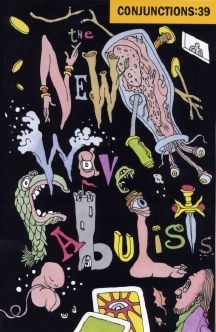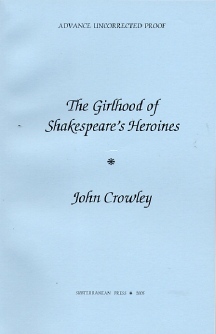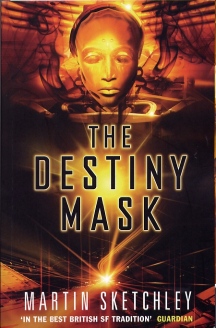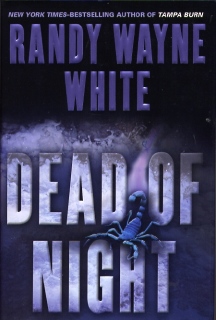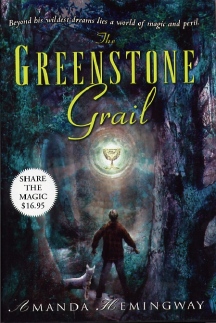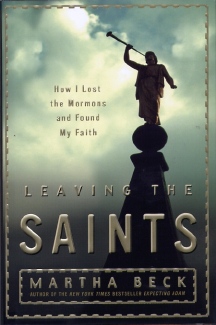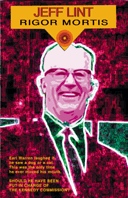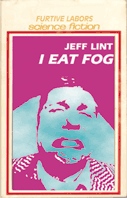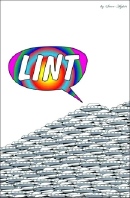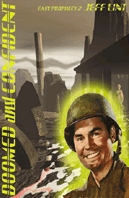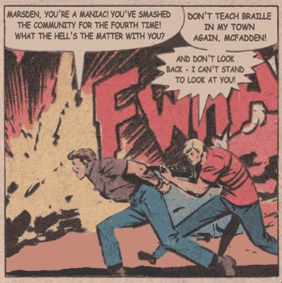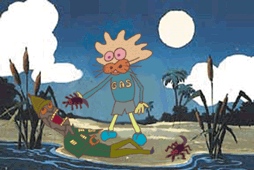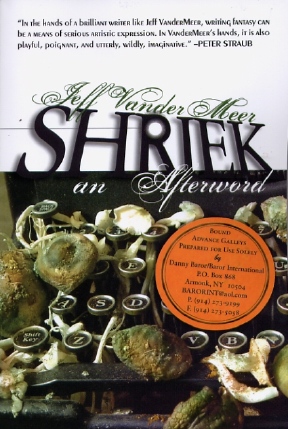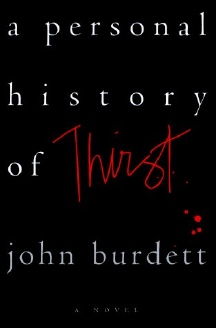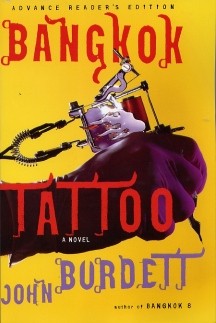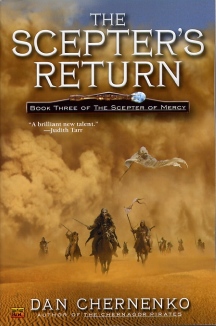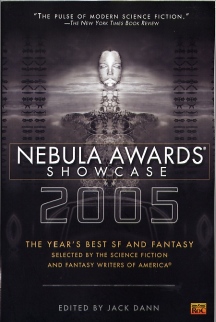|
|
|
This Just In...News from the Agony Column
|
03-18-05: 'The Girlhood of Shakespeare's Heroines' by John Crowley; Martin Sketchley 'The Destiny Mask' |
||||||
From
Conjunctions to Hardcover
Yes, I said that. You can quote me: The future of mumble-mumble. I submitted this article to Time magazine, but they havent got back to me yet, so I'm running it here. Go figure. I've got Conjunctions:39 sitting on my table at the moment, and I can hardly draw my eyes away. A to-die-for author/editor/illustrator list, gorgeous, generous trade paperback production. As soon as a bit of money comes in, I'm subscribing. In the interim, readers can annihilate a day or two over at their website. It's gorgeously designed, and excellently executed. And best yet, none of that gets in the way of the oodles and oodles of content they have, including audio content. All hail Editor Bradford Morrow, managing editor Michael Bergstein, a huge crew of guest-editors, and life itself for offering such great bounties. And Conjunctions:39 marked the actual first appearance of John Crowley's 'The Girlhood of Shakespeare's Heroines'. For those of us who love the novella format in hardcover copies, this is the kind of boon we have to depend on small publishers for, and Subterranean Press is one of the best. Getting John Crowley, acclaimed author of such genre icons as 'Aegypt' and 'Little, Big' into a signed, limited edition hardcover novella is a brilliant idea that has not come soon enough. One hopes that down the line, Sub, Crowley and JK Potter are working on illustrated versions of the classics. Yes, this is purely speculation, but since this website features a good chunk of writing about speculative fiction, I'm allowed to speculate. I've written about speculative non-fiction before; just add this article to that batch of writing.
It also demonstrates that Conjunctions is indeed the future; or that at least, within Conjunctions one will find future standalones in their first blush. It's nice to have Conjunctions and it's nicer to have the Subterranean Press version of this story. One need only look at the current issue to wonder what lies in the future of Conjunctions. Mumble-mumble. <-- QUOTABLE! |
||||||
The
Structure Grows in Trade Paperback
What we love. The twin sons of Vourniass Lycern from 'The Affinity Trap' have grown up under rather different circumstances. One has been reared under the not-so-tender auspices of General William Myson, the other brought up in a terrorist cell. So we've got a family with some family issues. I'm telling you a lot less here than you'll find out on the back of the book. Trust me, just hide it from yourself when it arrives in the mail, with the trade paperback version of the first book. Sketchley appears to combine all the ooey-gooey tropes of science fiction in reasonably sized, nicely published books. I think that somewhere down the line, someone will hit themselves on the head and wonder why they didn't put them out in hardcover, but, we all know that hardcover speculative fiction by relatively unknown authors -- like That Book -- does not sell. Unless of course it sells so well you have to wade through copies being foisted on you by every person you know who doesn't have a stack of books taller than themselves waiting to be read. Here's a good idea; pick up the trade paperback version of 'The Affinity Trap', and then keep your mass-market paperback version handy to foist back on those who would foist first. Alternate it with the MMPB of Neal Asher's 'Gridlinked', and maybe you'll be able to not only avoid That Book, but better, offers the readers of TB a glimpse of the hope that there are other books in the speculative fiction world beyond TB. Of course, Sketchley's writing Space Opera, not Chase Opera. So there are some differences. Readers on the US side of the Atlantic who are averse to flying books about can rest easy knowing that the ever talented Lou Anders over at Pyr books is going to publish these in the US. We know that there are at least three books, though Sketchley's website doesn't tell us anything about the third. Still, they are coming out at a rapid clip, so we can certainly plunge ahead and read them as the come, confident that the next title will be along before too long. Though it's likely to take more than a month. |
|
03-16-05: Steve Aylett on Jeff Lint |
|||||||||||||
A
Science Fictional Biography
We've recently had our riveting Philip K. Dick biography by Emmanuel Carrère, 'I Am Alive And You Are Dead' (also author of 'The Adversary'), and it got noticed pretty far and wide, well beyond these realms. So as the publishers look about for a follow-up, who better to chronicle the strange life of Jeff Lint than Steve Aylett, science fiction's current High Trickster? Aylett has, after all, been a finalist for the Philip K. Dick award. He's been pushing the limits of science fiction with his very bizarre 'Accomplice' series, and titles like 'Slaughtermatic'. Now, in 'Lint' (Thunder's Mouth Press / Avalon Publishing ; June 2005 ; $14.95), Aylett comes to earth -- well as much as it is possible for Steve Aylett to come to earth -- with a biography of Jeff Lint, author of such cult SF titles as 'Jelly Result' and 'The Stupid Conversation'. And, as many have suggested, the biography of some science fiction writers can be more entertaining than most science fiction.
We can thank Thunder's Mouth for the fine version of this book they're delivering, a nicely sized illustrated trade paperback complete with 8 pages of color photos of Lint's book covers, some of which are on display here, courtesy Aylett himself. As Aylett's book moves from Lint's childhood to the rumors of his death to his actual death -- after which the rumors persisted -- towards the stunning conclusion of Lint's life, readers who have grown up with science fiction in the years of Lint's life will see themselves raiding the rotating paperback cages at Zody's Department stores in Covina California, riding their bicycles 15 miles through a layer of Southern California smog to one of the first malls in Pomona to find obscure copies of Lint's paperbacks at the then-rare B. Dalton Booksellers, haunting the sales tables at suburban cons in New Jersey in the 1980's, picking through browned copies of F&SF, hoping to find the rare Lint stories.
Readers who can't wait for the Linto bio -- and that should be everybody -- can get a gander at more covers, and a glance at his other work on his official website at JeffLint.com. And though this will only whet your appetite, rest assured that the bio may raise more questions than it answers. |
|||||||||||||
|
03-15-05: Jeff VanderMeer 'Shriek: An Afterword'; John Burdett 'Bangkok Tattoo' |
|||||||
The
Shriek Heard 'Round the World
This is the newest entry in his series of works about Ambergris, and it's his latest novel as well. I've managed to get a very-much in advance copy through the kindness of Jeff himself, who has given me what I am instructed to call: "bound galleys produced for VanderMeer's foreign agent only." It may be bound galleys, it may be his newest Ambergris, but it's a lot of other things besides, things that are strange, even for Jeff VanderMeer. Or perhaps especially for Jeff VanderMeer. That's because Jeff's work thus far has been a monument to the exceptional. He wrote a fantasy novel -- 'City of Saints and Madmen' that, for readers of say George R. R. Martin or J. R. R. Tolkien probably looks neither like fantasy or a novel. His science fiction novel, 'Veniss Underground' is the type of science fiction novel that makes the reader wonder if the pages were laced with some sort of psychotropic drug. It's a couple of years old and still seems bracingly, almost confrontationally new. It sort of gets in your face, what with decapitated meerkats and city-sized organisms. Think how long it was before 'Neuromancer' left the bleeding edge. It'll probably take that long for 'Veniss Underground' to enter a more conventional science fiction dialogue. Only 'Secret Life', his short story collection, pretty much resembles other short story collections. Of course, short story collections in the science fiction world in general have a lot of leeway; VanderMeer uses that and then some. So what readers are probably not prepared for in his latest novel is the fact that it looks as if it will be a fairly straightforward novel-reading experience -- albeit one that will run from the power he's developed out in the hinterlands of experimental fiction. VanderMeer's hunkered down and given not only his fans but those who -- know it or not -- would like to be his fans -- a not-too-big slice of life in good old Ambergris. 'Shriek: An Afterword' is the story of Duncan Shriek -- and the city of Ambergris -- as told by Duncan's sister, ex-society maven Janice Shriek. Duncan is an historian with obsessions that may save him or bring him to ruin. Fraught with success, suicide, failure and the details of everyday life subtly transformed by the setting of Ambergris, the Family Shriek story promises to be fatally fascinating. The city of Ambergris is caught in a war between two publishing houses, while the downtrodden gray caps plot a fungal revenge. Janice finds herself in circumstances she'd prefer to avoid as she tells a story spanning decades of life in the Big City According to Ambergris. VanderMeer promises humor, horror, the surreal and the so-real emotional lives of characters caught up in one day after another -- in a city like no other. Given his already ample track record, it's incredible to think that this is Jeff's first novel for a New Yawk publisher. For my readers, Jeff VanderMeer is already a household word, but he's about to become a household word for a whole world of readers who have never encountered his world. This 'Shriek' will indeed be heard 'round the world. What we have to look forward to with 'Shriek: An Afterword' is nothing less than the first normal Ambergris novel. Yes, I realize that this is an oxymoron. You should expect no less from VanderMeer. |
|||||||
Needles in the Book Stack
I'm happy to report to readers that Sonchai Jitpleecheep is back again in 'Bangkok Tattoo' (Alfred A. Knopf / Random House ; May 10, 2005 ; $24.00), and once again, he's going to be faced with some very difficult choices. He's still a detective in District 8, so he's still scuttling amidst the dregs and bottom-feeders of a notoriously corrupt underbelly in Bangkok, itself notoriously corrupt. So the mutilated dead body whose killer he's supposed to discern is not unexpected. That it might be a CIA agent is unexpected. And that the killer might be associated with Sonchai certainly is unexpected. And that excuses involving Al Qaeda might worm their way into a rapidly blossoming mess -- well, this is after all Thailand. And the newest Sonchai Jitpleecheep mystery. That alone would make it an auto-buy selection. But with art direction by Chip Kidd and the kind of surprises that Burdett manages at every turn, this turns into the kind of novel that makes you look at Burdett's back-catalogue, which includes 'The Last Six Million Seconds' and 'A Personal History of Thirst', his first novel. The latter unravels a deadly love triangle across the vagaries of the British class system, while the former is a thriller set in 'The Last Six Million Seconds' before the handover of Hong Kong. They're both still sort-of findable in used hardcover first editions, but look for that to change in the coming months. Burdett is touring this spring to promote the book, so look for the profile to climb. Readers who have yet to enjoy 'Bangkok 8' might want to sort through the remainder pile at their local independent bookstore. I saw it both in hardcover and in trade paperback. Try this. Buy the trade paperback, read it, and try not to go looking for a hardcover first. Be glad that theyre still reasonably priced. It's not often I sneak a reasonably priced book out of left field and into your bookshelf, now is it? |
|
03-14-05: Three Disparate Books: Dan Chernenko 'The Scepter's Return', Caroline Kraus 'Borderlines', 'Nebula Awards Showcase 2005' Edited by Jack Dann |
|||
An Absence of Toasters
So who is going to read Dan Chernenko's 'The Scepter's Return': Book Three of 'The Scepter of Mercy' (Roc Fantasy / Penguin Putnam ; March 2005 ; $14.95)? Presumably, there's a built-in audience from the first two books in this series, 'The Bastard King' and 'The Chernagor Pirates'. Chernenko has carefully brought out his books on the annual installment schedule, and his readers will certainly thank him for promptly finishing up a series started a mere two years ago. Of course, with this fast and very regular pace, one might well suspect that some two years ago Chernenko turned in a completed 1,500 page doorstop and said: "Here you go!" And thus are series born. No, sorry, getting all paranoid on you here. It's just that when the rear-view mirrors I have mounted on my shoulders get out of adjustment, well, I tend to get a little nervous. As with most contemporary heroic fantasy, 'The Scepter of Mercy' looks a little bit like another series you may have heard something about or even seen in a filmed version. Essentially, the Scepter of Mercy is in the hands of those who neither know nor care of its potential. The Banished One wants to get his hands on it. With that moniker, you can guess he's not a nice guy. On the other side, King Lanius and King Grus have a foolproof plan to get the Scepter and set matters right. Foolproof, but not, apparently, Banished-One-proof. Chernenko's trilogy appears to offer all the comforts of home, if home for you is a meaty fantasy trilogy about daring-do and dating don'ts ("Don't date an acolyte of the Banished One"). We'll note for posterity here that the cover image is by Steve Stone, who did the cover image for Tor's and Bantam UK's 'Deadhouse Gates, the second entry in Steven Erikson's 'Gardens of the Moon' series. And I've got to say that it certainly succeeds at giving this book an Erickson vibe, and making it attractive to this reader, were this reader able to spin himself off into a parallel universe and / or read about ten times as fast he currently does. For what fantasy fiction offers these days is a one-two punch of comfort and the familiar imagination. Fantasy offers comfort because the choices are clear. Good is over here, polishing up armor and plowing the earth to feed the poor. Evil is over there, cackling insanely, gorging itself on food purloined from who-knows-where and leering at scantily clad women and/or men. None of reality's confusing we're going-to-kill-you-to-save-you moments. Better yet, nobody even has to bother to vote. Either youre with the former, and just have to ride it out, or you're under the latter, and had best enjoy things while you can, 'cause there's a comeuppance on the way. And while each author offers an imaginative vision, those visions tend to rest on the bedrock of a world where weaponry is mainly just sharp things, and where magical spells, which are sort of like computer programming for reality, are the only technology. No complicated toasters allowed! In this world, there are apparently droves of people who read really, really fast and really, really enjoy a reality break. Who can blame them? Not I, who happen to be enjoying a permanent reality break. The fast readers are buying up fantasies like this as fast as they can and whether they know it or not, helping fight the good fight to see that other, edgier writers get a chance as well. It's a very complicated economic ecology that keeps a brittle layer of weird stuff floating atop a sea of predictably entertaining fantasy. And, of course, unreasonably complicated toasters. I'm just hoping that someone need not be forced to kill me in order to save me from my complicated toaster. The only spell I know is spell-check, even then, well, it works just about as well as computer programming -- or magic. |
|||
Playing Catch-Up In Style
Look into my eyes. We're here to help. I like the cover design by Ray Lundgren, and I like plenty of the fiction within as well. You've got 'The Empire of Ice Cream' by Jeff Ford, 'OWNZORED' by Cory Doctorow, Carol Emshwiller's 'Grandma', and Harlan Ellison's 'Goodbye to All That' complete with one of his patented introductions, in this case, his tale of submitting the work to 'Zoetrope All Story'. Given the story found a home in McSweeney's, well, you can imagine his anecdote, and this one is as funny as the story itself. One of the real reasons to buy this anthology is the fact that it offers the printed versions of stories that first show up online, on super-duper respected sites like Scifiction at Scifi.com and Strange Horizons. Until smart paper shows up, this will be the best way for us to read this fiction while eating shrimp tacos for lunch on the Santa Cruz Wharf. The other big value add-on is the space given over to actual criticism of the genre. This time around you get the views of Paul McAuley, China Miéville, Lucius Shepard and Bruce Sterling. But even better is the inclusion of Jeff VanderMeer's standout 'The Romantic Underground: An Exploration of a Nonexistent and Self-Denying Movement.' It's a hilarious look at the proliferation of subgenres that goes on in SF&F. And it demonstrates that yes, we can laugh at ourselves. We can, really. Look into my eyes. We're here to help. |
|||
Psycho Memoir
Her first friend upon arriving was a charismatic beauty named Jane. Jane and Caroline were perfect for one another. Jane offers Caroline a free-spirited friendship, supportive, intuitive and understanding. The two soon become inseparable. And that soon becomes a problem. Caroline has just unknowingly landed herself on one of the slippery slopes of San Francisco, a human San Andreas Fault with tremors aplenty and problems that reach right to the center of her soul. Jane, it happens, is the kind of gal who slices herself with razors. Who has maybe a couple of identities on the side, and a financial record that's the girly, personal version of Enron. What unfolds in 'Borderlines' is a tale of broken identity, of horrific manipulation, of financial ruin and physical aggression. Everybody might look pretty on the cover, but underneath, readers are going to find an even more pleasing look at ugliness. For anyone who has ever had a psycho-friend, or known someone who had a psycho-friend, 'Borderlines' is required, if uncomfortable reading. And that "uncomfortable reading" tag may make it perfect fodder for a whole host of readers who like their horror light-of-day realistic. It doesn't get much more real than this memoir, but then, this is a reality that most of us would greatly prefer to encounter as a reading experience, not a life experience. And oddly enough, that's what makes it such a compelling reading experience. Come to think of it, what you have here is a typical monster book where the monster not only pursues the pretty girl, the monster is a pretty girl. Of course, in many life experiences that is often the case. And if one of these girls is not like the other -- or anyone you know, for that matter -- count yourself lucky. |
